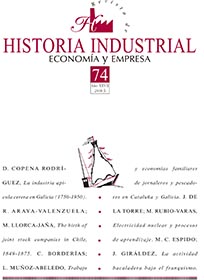Nuclear power and learning processes: the role of Westinghouse and General Electric in the Spanish experience (c. 1955-1973)
DOI:
https://doi.org/10.1344/rhi.v27i74.19843Keywords:
nuclear energy, know-how, technology transfer, learning processAbstract
This article explores the learning and technology transfer processes that placed Spain among the firstcomers of nuclear energy in the late 1960s. It is an example of a infantindustry that, under the protection of the State and the action of the business consortiums and of the North American multinationals, was able to replicate a complex technological challenge. We analyzed how an entrepreneurial ecosystem was created in which the leadership of some engineers and the cooperation and competition between industries, engineering and consultants were key. The business history of the Zorita and Garoña nuclear power plants exemplifies a model of learning by doing that, through turnkey contracts, allowed a rapid growth of the sector, convincing the dictatorship government and the electric promoters that it was possible to carry out one of the most ambitious nuclear programs in Western Europe.
Downloads
Downloads
Published
How to Cite
Issue
Section
License
We have been applying a Creative Commons Attribution license (CC-BY) since 2019, before that year we had a partial open access policy, which included open access for the first two months after publication, followed by an embargo policy for non-subscribers, as access to the last 4 published issues was restricted to journal subscribers. In contrast, early-view articles were always open access prior to publication in an assigned volume. Until 2024 the access to the last 4 published numbers was restricted to those who were subscripted to the journal.
The author assigns all rights to the publisher. Creative Commons
The author who publishes in this journal agrees to the following terms:
- The author assigns all intellectual property rights exclusively to the publisher for the entire duration of the applicable intellectual property rights. The University of Barcelona holds the copyright ownership of the contents published in the journal.
- The publisher will distribute the texts under the Creative Commons Attribution License, which allows others to share the work, provided that they acknowledge the authorship, its initial publication in this journal, and the conditions of the license.





